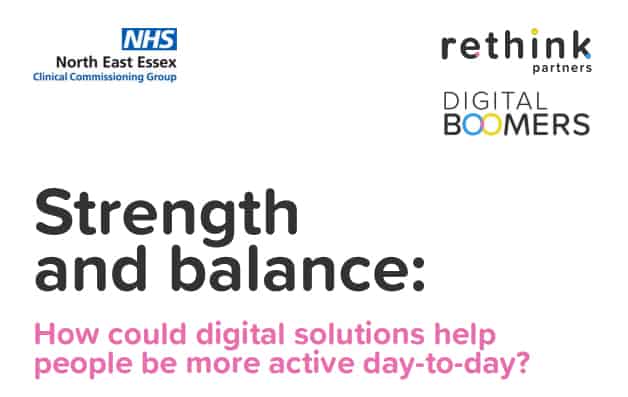Professionals need support to use tech to improve engagement in strength and balance activity, report finds

A new report published by Rethink Partners and NHS North East Essex Clinical Commissioning Group (CCG) has discovered that a lack of access to strength and conditioning activities throughout the pandemic could have the potential to cause a long-lasting increase in falls and frailty among the over-70s.
Residents in Colchester, Essex and surrounding areas, including those in sheltered housing and residential homes across North Essex, took part in a six-month project. It was initially commissioned to understand and highlight the benefits of using technology to help strength and balance in older adults.
During the engagement, participants described both their physical and social ‘deconditioning’ due to the loss of communal space during the pandemic, compounding the motivational challenge to engage in strength and balance activity.
The findings, which have been published in a Strength and Balance Playbook, produced by Rethink Partners in association with NHS NEE and the Prevention and Enablement Model (PEM) Programme Board, highlight a clear need to work not only on physical exercise, but on reintegrating with society following severe social isolation caused by the pandemic.
One of the key findings from the report, ‘Strength and balance: How could digital solutions help people be more active day-to-day?’, was that professionals need support to harness the power of technology to support engagement in strength and balance activity. Some staff are very keen to assist residents with using technology, others shy away due to their own confidence levels, according to the report.
Importantly, the report discovered that there were two broad attitudes to using technology: those that were using technology in their lives and had experimented with gadgets at home, and those that were suspicious or fearful of technology and had no intention of using technology.
Both groups present an opportunity for commissioners, service designers and those delivering services to provide targeted support to address motivation, opportunity and capability, the report recommends. It also suggests that there is an opportunity to get users more engaged with digital activities and help them to learn digital skills.
According to an earlier report published by Public Health England in 2021, the average duration of strength and balance work decreased from 126 to 77 minutes a week between March and May 2020 compared with the corresponding period in 2019. This pattern still does not seem to have fully recovered, Rethink Partners highlights.
Older people experienced a considerable reduction in strength and balance activity between March to May 2020, with the greatest change in the 70 to 74 age group with a 45 percent (males) and 49 percent (females) decrease observed in activity.
Without mitigation, modelling predicts that:
- 110,000 more older people are projected to have at least one fall per year as a result of reduced strength and balance activity during the pandemic
- The total number of falls could increase by 124,000 for males and 130,000 for females
- For each year that the lower levels of strength and balance activity observed during the pandemic persist, there is projected to be an additional cost to the health and social care system as a result of the change in predicted related falls of £211 million (incurred over a two-and-a-half-year period)
While there is plenty of research around activity, there is little evidence around how digital tools can help people be more active in their everyday lives, the report outlines.
The Strength and Balance Playbook reviews this latest research and resources and summarises the findings. The playbook is designed for anyone who is planning, designing or delivering digital care services for strength and balance. It explores behaviour change models and how digital solutions could help in the future.
It also includes useful links to strength and balance workouts, provided by NHS England and others.
One of the suggestions the report makes for encouraging people to engage in strength and balancing activities is to make services easy to use with simple messaging. It says that including rewards in services, such as financial rewards, incentivises and motivates people to engage with services.
Read the full report here.

